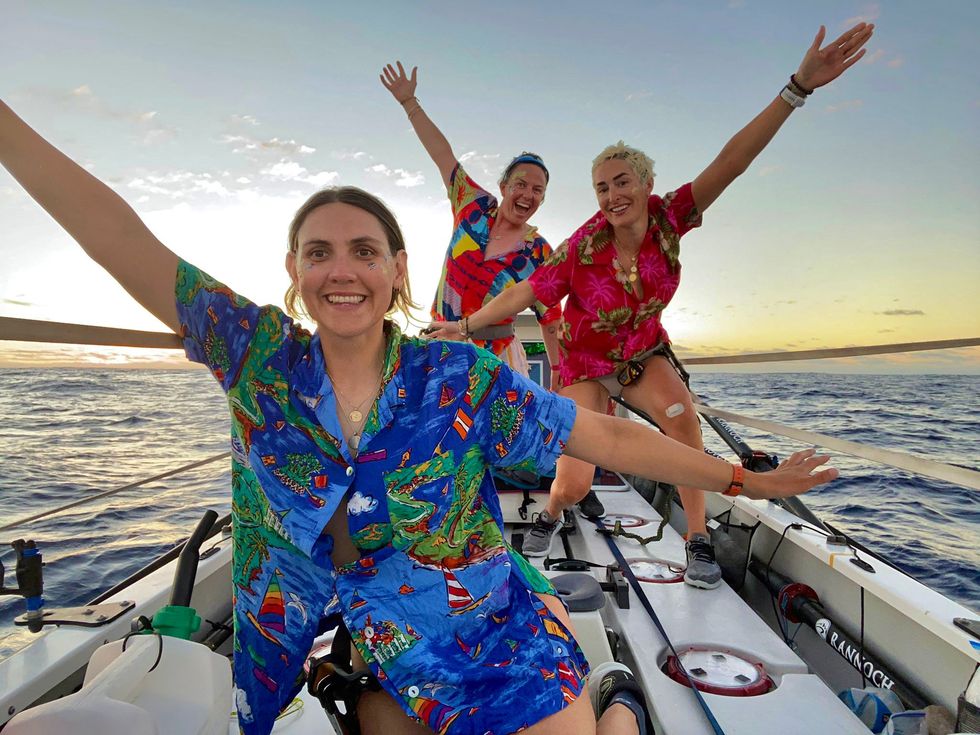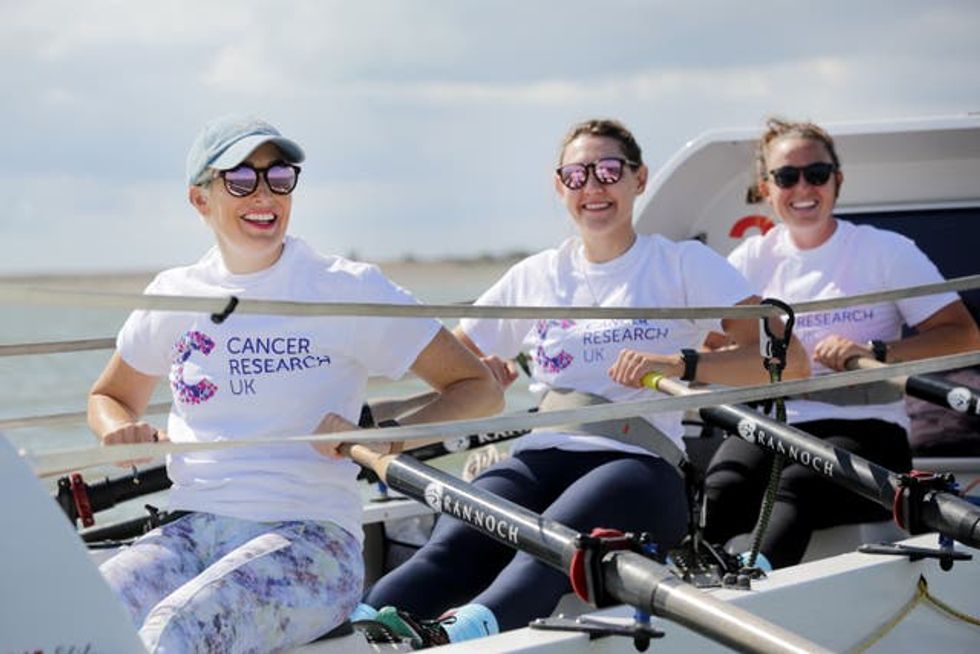News
Alana Calvert
Jan 24, 2022

L-R British rowers Abby Johnston, Charlotte Irving and Kat Cordiner smashed the world record for rowing across the Atlantic (PA).
Three British women, one of whom has incurable cancer, have shattered the world record for rowing across the Atlantic.
Kat Cordiner, who has secondary cervical cancer, and teammates Abby Johnston and Charlotte Irving, arrived in Antigua on Sunday evening.
The women completed the 3,000-mile crossing from La Gomera in the Canary Islands to English Harbour in 42 days, seven hours and 17 minutes, knocking an astonishing seven days off the female trio record in the Talisker Whisky Atlantic Challenge.
The women were given an emotional dockside welcome by family and friends who had flown out to celebrate with them.

As they stepped onto land for the first time since December 12, they said they felt “wobbly, overwhelmed and happy”.
Rowing the world’s second largest ocean is acknowledged as the ultimate endurance race. More people have summitted Mount Everest than have successfully rowed the Atlantic and fewer than 20% of ocean rowers are women.
It is thought Ms Cordiner is the first person to tackle this challenge as a cancer patient.
The women are raising money for Cancer Research UK, Macmillan Cancer Support and The Royal Marsden Cancer Charity.
Race organisers said they had shown the impossible was possible.
Ms Cordiner, 42, Ms Irving, 31, and Ms Johnston, 32, were on a 25ft boat – called Dolly Parton – rowing two hours on and two hours off continuously and unsupported.
When they set off, Camilla, Duchess of Cornwall, sent them a hand-written good luck message wishing them “fair winds and following seas”.
During their epic trip they experienced scorching heat, enormous night-time waves, sleep deprivation, blisters and callouses on their hands, and sharks trailing their small boat.
However, they got through with sheer determination and making their own entertainment.
As they arrived, the waiting crowds were told: “If you followed their social media, these ladies made rowing the Atlantic look like one big party at Club Dolly Parton with karaoke, Hawaiian shirts, face glitter and glow sticks.”
The doctors have told me I don’t have decades, I have years, so I really want to make the most of them. I don’t want to muck around doing stuff that doesn’t matter - I want to do things that are challenging and fun.
Kat Cordiner
Along the way they celebrated Christmas, New Year and Kat’s 42nd birthday, cracking open a bottle of prosecco.
Money is still pouring in but the women hope to raise £100,000 to be shared between the three cancer charities.
Simon Ledsham, Director of Fundraising for Cancer Research UK said: “We are in awe of what Kat, Abby and Charlotte have taken on and achieved. They are remarkable supporters, not least Kat, who is an inspiration to thousands of other people facing their own cancer journey.
“We want to send them huge congratulations on their world record as well as our grateful thanks for raising funds for Cancer Research UK and for highlighting the need for more funding to develop better and kinder treatments for all types of cancer.
“We hope they will spend their first night back on dry land in a comfortable bed, knowing they have achieved a dream, are now world leaders in their field and have raised funds that will help us shape future treatments.
“But for now, we hope they celebrate in style. As Camilla, Duchess of Cornwall said when they set off – it was an OARsome undertaking – and they are awesome women!”
Ms Cordiner was diagnosed with cervical cancer in March 2019, completely by chance as she was having her eggs harvested in the hope of having a baby in the future.
She was “distraught”, although she said she was more upset about not being able to carry a child than she was about the cancer.
Kat underwent a radical hysterectomy but doctors left her ovaries as she wanted to do another round of egg-freezing. Once her eggs were harvested, she had her ovaries removed.
After the surgery, all seemed well. But in June 2020, she began experiencing stomach pains and knew instantly the cancer was back.
Ms Cordiner worried that going back into treatment would scupper the crew’s chances of taking part in the Atlantic Row.

But there was a further blow – despite training through chemotherapy, doctors found a growth on her heart and told her to stop exercising immediately.
Her medical team treated the cancer first and then operated on her heart to remove the tumour.
She was treated with carboplatin, paclitaxel, and targeted therapy drug avastin, as well as six sessions of radiotherapy. Cancer Research UK was involved in the development of paclitaxel and played an important role in the underpinning research behind carboplatin and avastin.
After exhausting intensive cancer treatment, heart surgery and six months without training, she got back in the boat.
Ms Cordiner said: “It floored me a bit initially and more than anything I was peeved because I couldn’t exercise. But when I got back in the boat, I was quite strong – I knew I could do it!”
The 42-year-old is now in remission and only taking drugs to deal with the effects of being plunged into an early menopause.
She said: “The doctors have told me I don’t have decades, I have years, so I really want to make the most of them. I don’t want to muck around doing stuff that doesn’t matter – I want to do things that are challenging and fun.
“I don’t know how long I’ll be in remission. A lot of people think cancer/chemo/death. But today the drugs are so much better – you can live your life with cancer. People live for years on treatment.”
To donate to Cancer Research UK, Macmillan Cancer Support and the Royal Marsden Cancer Charity, head to the We Are ExtraOARdinary Go Fund Me page.
Top 100
The Conversation (0)













